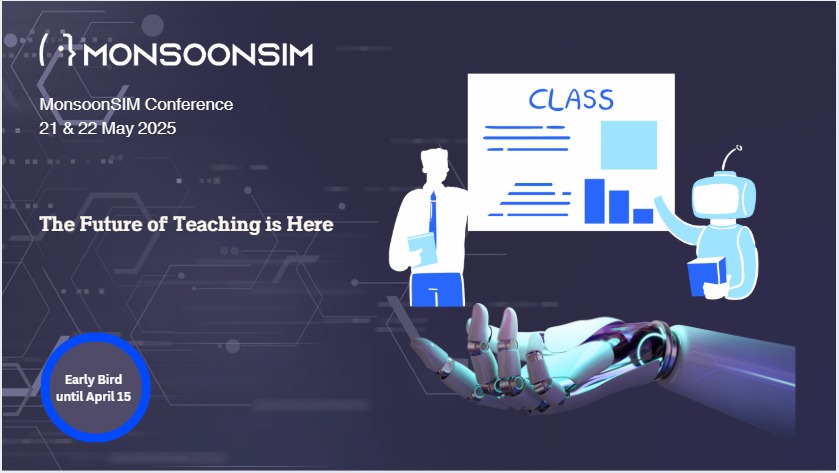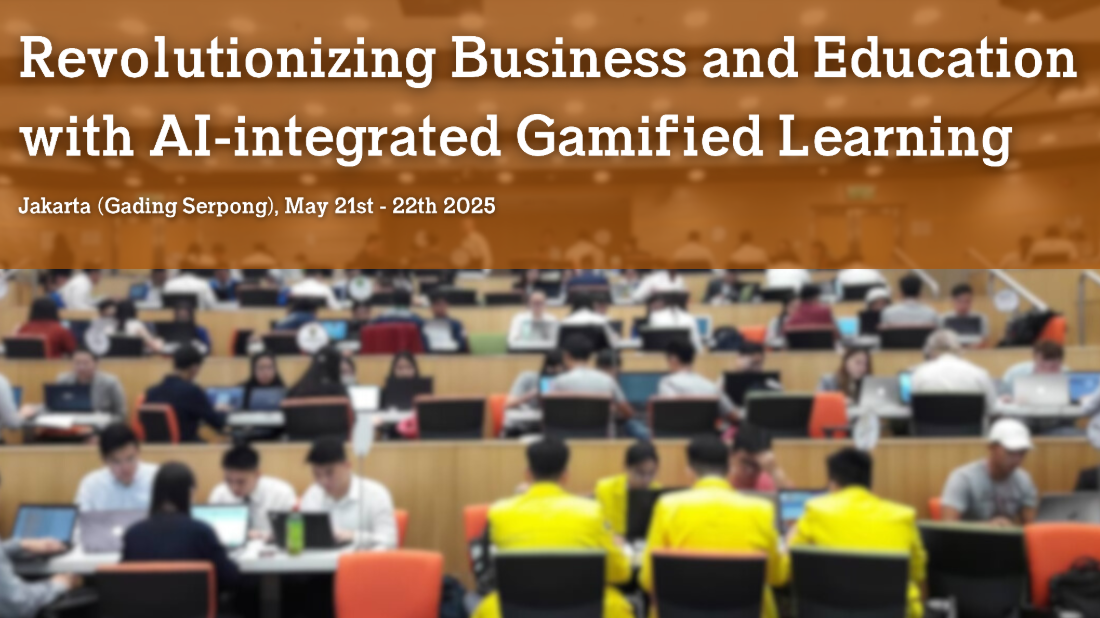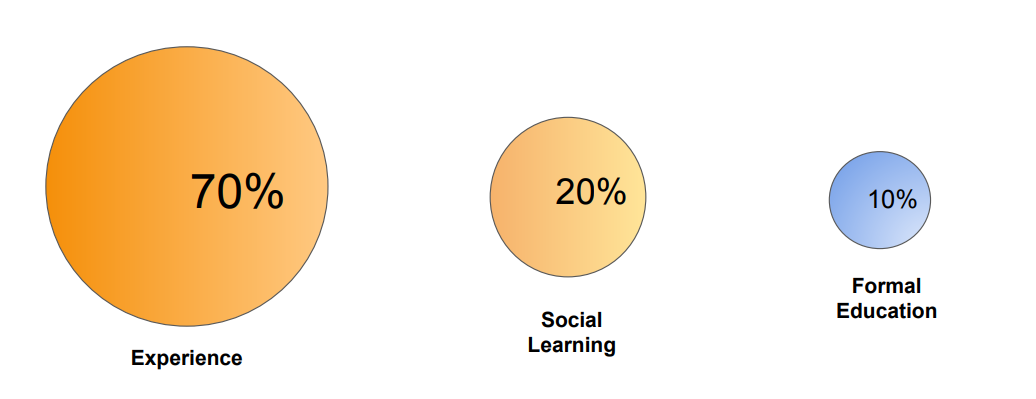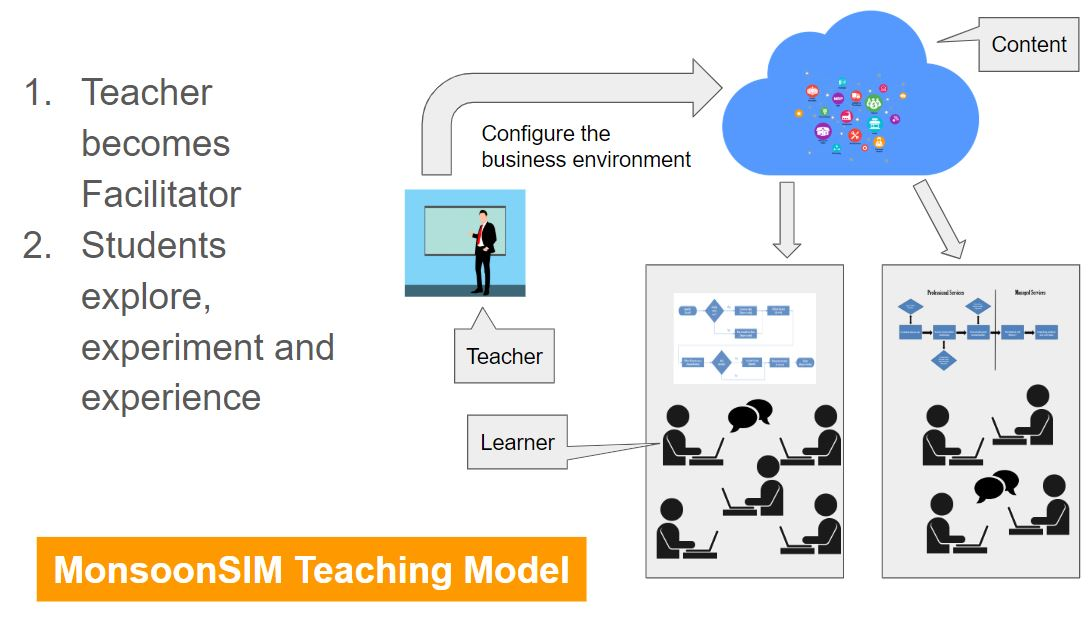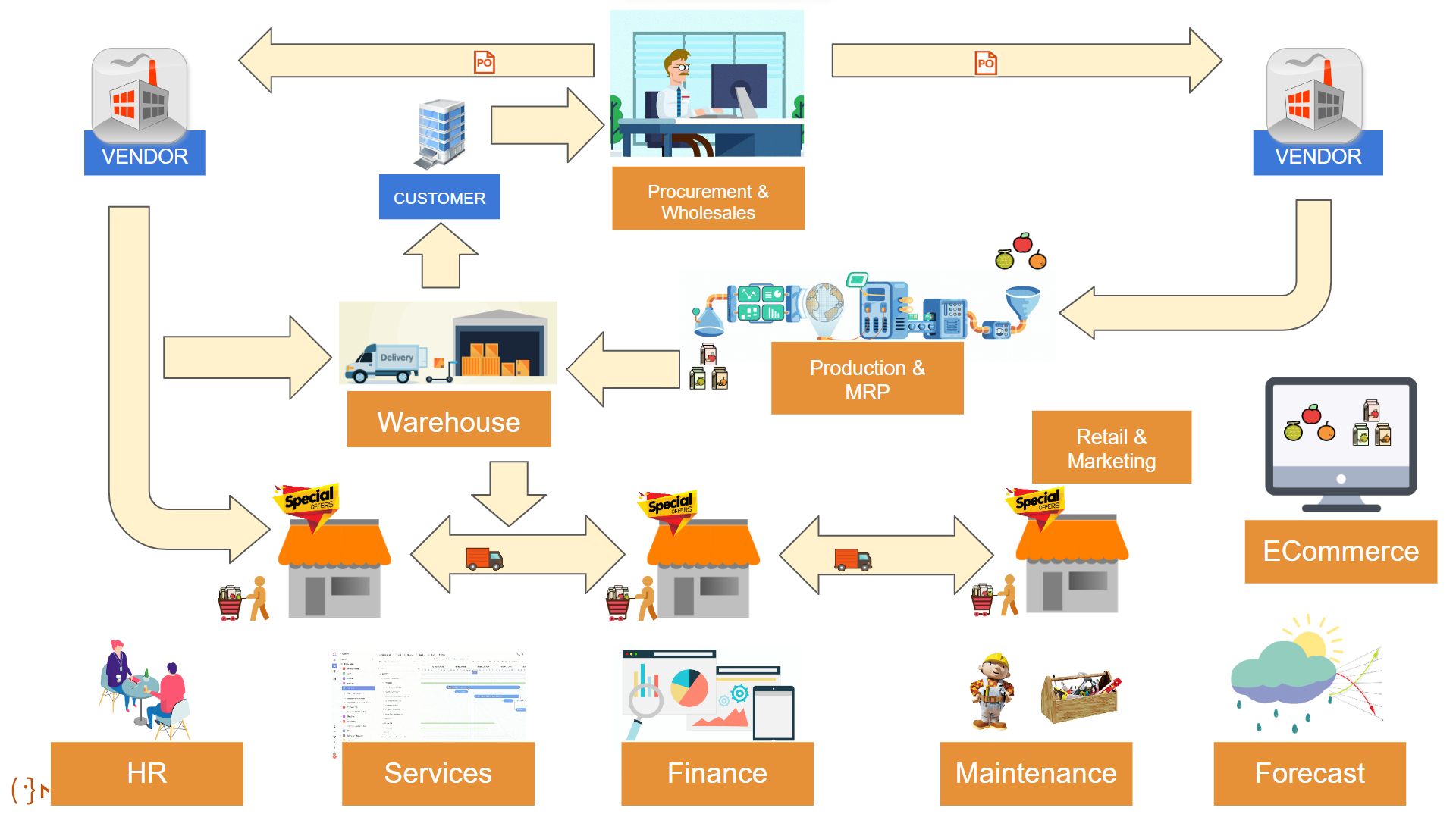What is Business Simulation? The Transformative Role of AI and Gamification in MonsoonSIM

Jan 07, 2025
- Defining Business Simulation
- Focus on AI and Gamification
- The Role of AI in Enhancing Business Simulations
- AI as a Facilitator Tool
- Gamification: Engaging Learners Through Competition and Collaboration
- The Synergy of AI and Gamification: A New Frontier in Learning
- Real-World Impact: Success Stories from the Classroom
- Quantitative and Qualitative Benefits
- Leveraging Learning Analytics for Personalized Education
- Enhancing Interdisciplinary Teaching and Learning
Defining Business Simulation
Business simulation is an educational method that replicates real-world business environments in a controlled, risk-free setting. It allows participants to engage in decision-making, strategy formulation, and problem-solving activities, providing hands-on experience in managing business operations. Unlike traditional learning methods that focus on theoretical knowledge, business simulations immerse learners in dynamic scenarios where they must apply concepts in real-time, making decisions that mirror the complexities of actual business situations.
Focus on AI and Gamification
MonsoonSIM elevates the traditional business simulation experience by incorporating advanced Artificial Intelligence (AI) and gamification elements. These tools transform the learning process, making it more interactive, personalized, and engaging. MonsoonSIM doesn’t just simulate business environments; it uses AI to tailor the experience to each learner’s needs, while gamification adds a layer of competition and motivation that keeps participants deeply engaged in their learning journey.
The Role of AI in Enhancing Business Simulations
AI-Driven Personalized Learning MonsoonSIM’s Boz AI assistant is a powerful tool designed to enhance the learning experience by personalizing it for each participant. AI-driven personalized learning in MonsoonSIM is characterized by several key features that make the simulation experience both effective and engaging:
Key Features of Boz AI:
Feature and Description
| Real-Time Feedback | Boz AI provides immediate feedback on decisions made during the simulation, helping learners understand the consequences of their actions and guiding them toward better strategies. |
| Adaptive Difficulty | The AI dynamically adjusts the complexity of challenges based on the learner’s performance, ensuring the simulation remains challenging but not overwhelming. |
| Learning Style Adaptation | Boz AI tailors its guidance based on the learner’s preferred style—whether they learn best through visual aids, hands-on experimentation, or detailed explanations. |
| Skill Level Adjustment | As learners progress, Boz AI adjusts the simulation to keep pace with their developing skills, providing more complex scenarios as their understanding deepens. |
Personalization Benefits:
- Customized Learning Pace: Each learner progresses at a speed that suits their individual learning needs, ensuring that no one is left behind or unchallenged.
- Enhanced Engagement: Continuous adaptation and immediate feedback keep learners engaged, reducing the risk of disengagement or frustration.
- Better Concept Retention: Tailored feedback reinforces learning, helping learners retain knowledge more effectively and apply it confidently in future scenarios.
Example of AI in Action:
Imagine a learner struggling with inventory management. The Boz AI might notice repeated errors, such as overstocking or running out of critical supplies. In response, it could offer tips on how to balance stock levels more effectively, provide additional resources like videos or articles on inventory best practices, or even adjust the simulation to give the learner more practice in this area before moving on to more complex challenges.
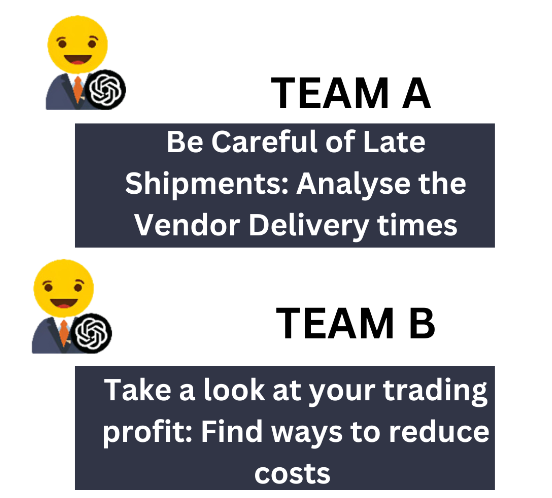
AI as a Facilitator Tool
Beyond benefiting learners, AI also plays a crucial role in supporting educators. MonsoonSIM’s AI tools provide educators with insights and resources to optimize the learning experience for all participants. Here are some of the key functionalities that AI offers to facilitators:
Educator Support Features:
Tool and Function
| Student Performance Analytics | AI generates detailed reports on student performance, highlighting strengths and areas where students may need additional support. |
| Automated Routine Tasks | Routine tasks such as grading and progress tracking are automated, allowing educators to focus more on teaching and student interaction. |
| Strategic Interventions | The AI suggests targeted interventions, such as assigning additional resources or exercises to students who are struggling, ensuring they receive the help they need. |
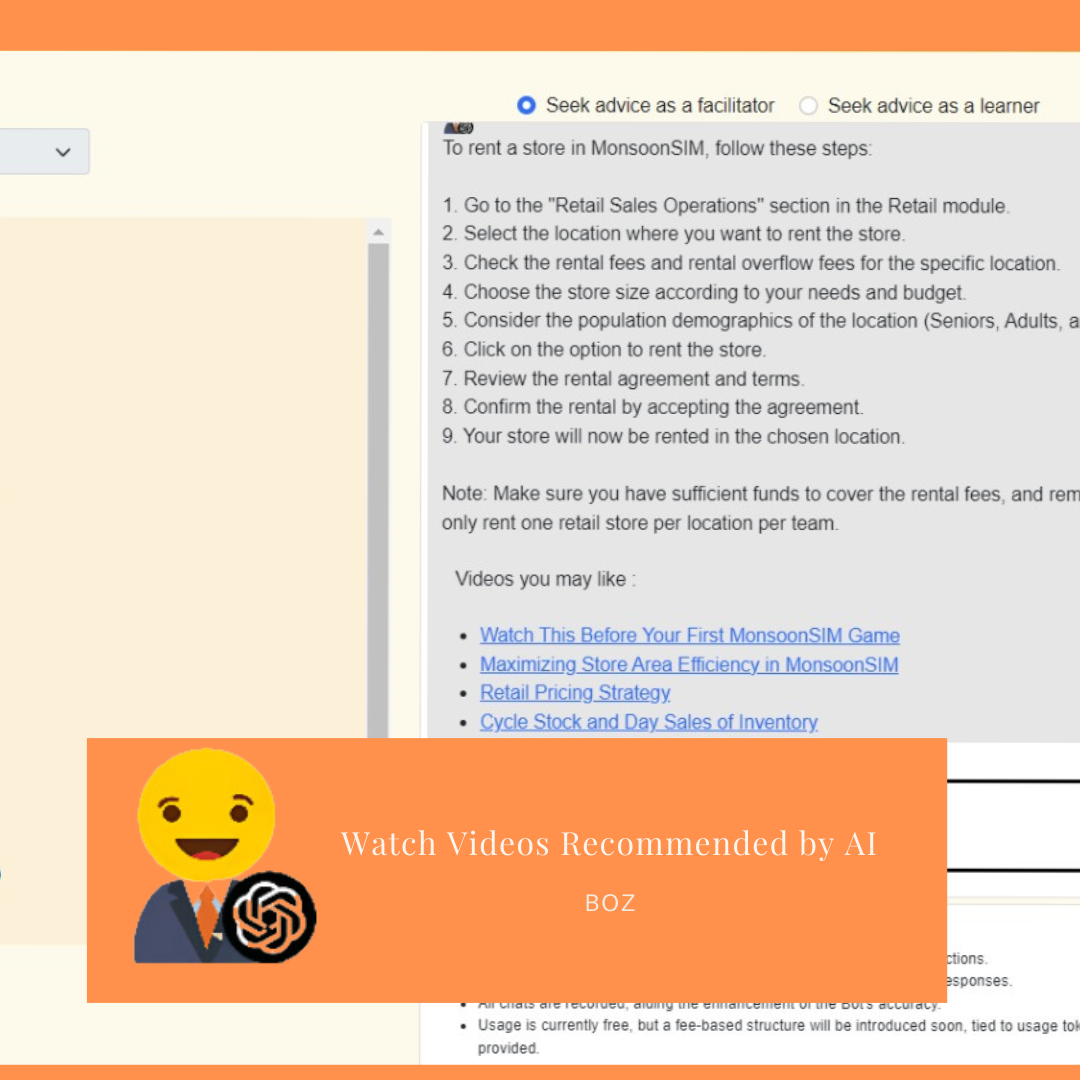
Benefits for Educators:
- Informed Decision-Making: Educators can make data-driven decisions, adjusting their teaching strategies based on real-time performance data.
- Efficient Use of Time: Automation of routine tasks reduces the administrative burden, freeing up more time for direct engagement with students.
- Improved Student Outcomes: Targeted support and insights from AI lead to better student performance and higher engagement in the learning process.
Example of AI in Action for Educators:
Consider a scenario where an entire class is struggling with cash flow management. The AI might alert the educator to this trend, allowing them to focus a lesson or discussion on this specific challenge. Additionally, the AI could suggest supplemental materials or exercises that target this area, helping the entire class improve their understanding and performance.
Gamification: Engaging Learners Through Competition and Collaboration
Gamification in MonsoonSIM is a strategic approach designed to enhance the learning experience by incorporating elements commonly found in games. These elements not only make the educational process more enjoyable but also encourage deeper engagement with business concepts through competition and collaboration. This approach is especially effective when combined with MonsoonSIM’s robust AI-driven analytics, which provide real-time feedback and performance insights.
Key Gamification Elements in MonsoonSIM
Leaderboards: Participants are ranked based on their performance in the simulation. This ranking system fosters a sense of competition and encourages learners to continuously refine their strategies, aiming to outperform their peers. The leaderboards, combined with AI analytics, allow for a dynamic learning environment where students can track their progress and make data-driven decisions.
Points System: A points system quantifies success across various aspects of the simulation, making each learner’s progress visible. By tying these points to specific business actions and outcomes, participants can see how their decisions impact their overall performance, providing a clear connection between theoretical knowledge and practical application.
MonsoonSIM’s gamified approach, coupled with its advanced AI tools, ensures that learning is not only engaging but also tailored to individual progress. This combination of gamification and AI analytics creates an immersive environment where students can thrive, making the learning process both effective and enjoyable .
Psychological Drivers of Engagement:
- Achievement: Gamification taps into the intrinsic motivation to achieve and excel, encouraging learners to push their limits and reach new levels of mastery.
- Competition: The competitive elements, such as leaderboards, create a dynamic where learners are motivated to outperform their peers, driving deeper engagement with the material.
- Recognition: Displayed progression in forms of achieving KPIs or engagements provide recognition for achievements, which in turn motivates learners to continue engaging with the simulation.
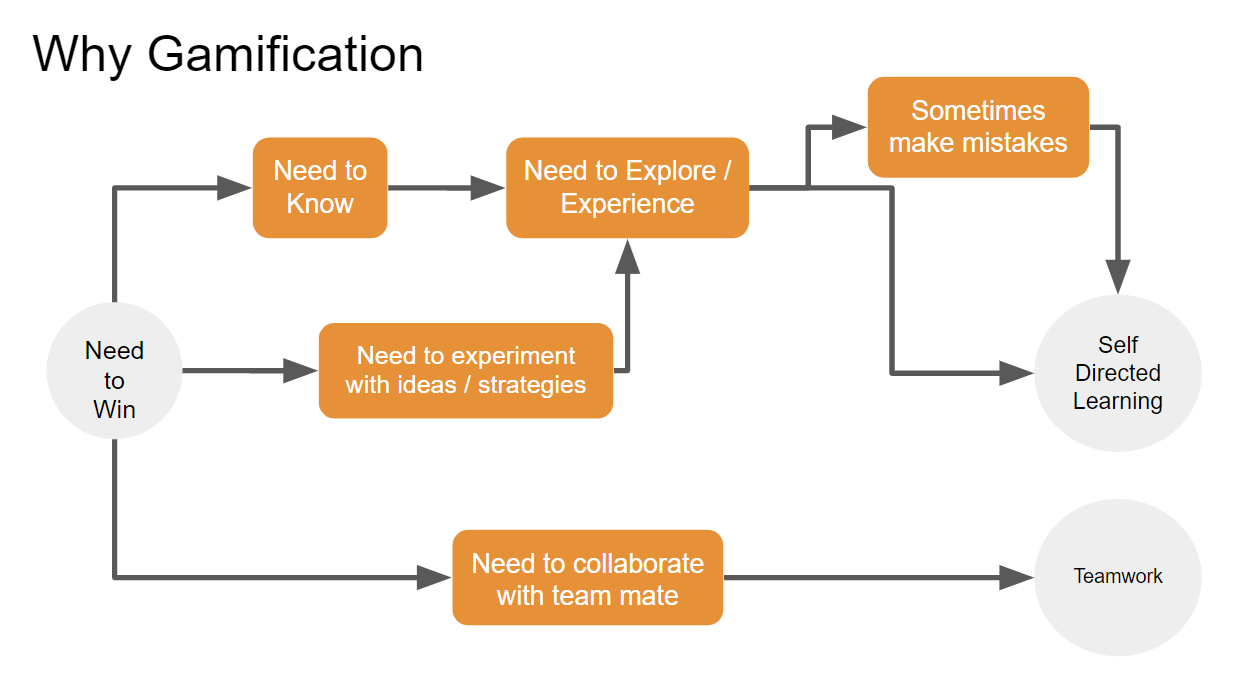
Example of Gamification in Action:
In a typical MonsoonSIM session, learners might be grouped into teams, each managing a virtual company. As they make decisions—such as pricing products, managing supply chains, or investing in marketing—they earn points based on their success. The leaderboard updates in real-time, showing which teams are leading. This not only motivates teams to improve their performance but also encourages them to analyze and learn from the strategies of top performers.
Building Critical Business Skills Through Game Mechanics
MonsoonSIM’s game mechanics are not just for fun—they are carefully designed to mirror real-world business challenges, helping learners build critical skills through practice and experimentation.
Core Game Mechanics:
Mechanics & Skill Developed
| Supply Chain Management | Teaches learners how to balance costs, optimize production schedules, and ensure timely delivery to customers, developing essential logistics and operational skills. |
| Resource Allocation | Learners must make decisions about how to allocate limited resources, such as capital and labor, teaching them to prioritize and make trade-offs. |
| Scenario-Based Challenges | Participants face scenarios that require them to think strategically and adapt to changing conditions, honing their problem-solving and critical thinking skills. |
Real-World Applications:
- Critical Thinking: Learners are required to evaluate complex, interconnected business scenarios, developing the ability to think critically and make informed decisions.
- Strategic Planning: Through game mechanics that simulate real business challenges, learners develop long-term planning skills, learning to anticipate future needs and respond to unexpected changes.
- Risk Management: Scenarios often involve balancing short-term gains against long-term objectives, teaching learners to assess risks and make decisions that align with their overall strategy.
Example of Game Mechanics in Action:
One of the challenges in MonsoonSIM might involve managing a company’s supply chain during a simulated crisis, such as a sudden increase in raw material costs or a disruption in the supply chain. Learners must decide whether to source materials from a new supplier, increase inventory, or cut costs elsewhere to maintain profitability. Each decision affects their overall performance, and the game mechanics provide immediate feedback, showing the impact of their choices on the company’s bottom line.
The Synergy of AI and Gamification: A New Frontier in Learning
AI-Enhanced GamificationMonsoonSIM effectively combines AI and gamification to create a dynamic and adaptive learning environment. This synergy is at the heart of what makes MonsoonSIM a powerful tool for business education.
How AI Enhances Gamification:
Personalized Feedback
MonsoonSIM's AI enhances the gamification experience by providing personalized feedback based on the learner’s performance. Instead of merely awarding badges or titles, the AI offers targeted advice and insights that help learners understand the impact of their decisions. For example, if a learner is managing cash flow, the AI might suggest ways to optimize spending or highlight potential risks, helping them make more informed decisions in future scenarios. Similarly, if a learner is excelling in resource management, the AI might recommend advanced strategies or areas for further exploration. This tailored feedback not only motivates learners to refine their skills but also guides them toward achieving specific learning objectives.
Real-Time Adaptive LearningThe combination of AI and gamification in MonsoonSIM results in a learning experience that is continuously evolving and responsive to the learner’s needs.
Features of Real-Time Adaptive Learning:
Features & Description
| Continuous Feedback Loop | Learners receive instant feedback on their actions, allowing them to adjust their strategies in real-time. This feedback is both immediate and contextual, helping learners understand the impact of their decisions. |
| Dynamic Scenario Adjustment | Based on the learner’s performance, the AI can alter scenarios to either increase complexity or provide additional support. For example, if a learner struggles with cash flow management, the AI might introduce a simplified scenario focused on this area before progressing to more complex situations. |
| Engagement Through Adaptation | As learners’ skills develop, the AI ensures that the challenges presented evolve in tandem, preventing the learning experience from becoming stagnant or repetitive. This ensures sustained engagement and continuous skill development. |
Example in Practice:
Consider a scenario where a team is managing a virtual retail business. As they make decisions—such as pricing products, managing inventory, and planning marketing campaigns—the AI tracks their performance. If the team demonstrates strong financial management skills but struggles with marketing strategy, the AI might introduce a scenario where marketing becomes crucial for success, forcing the team to focus on and improve this area. Simultaneously, the gamification elements (such as points and leaderboards) will reflect their progress, motivating them to refine their strategies and improve their overall performance.
Real-World Impact: Success Stories from the Classroom
Case StudiesMonsoonSIM has been successfully integrated into various educational institutions and corporate training programs, where it has significantly enhanced student engagement, knowledge retention, and the development of practical business skills.
Notable Case Studies:
- Integration: MonsoonSIM was incorporated into the undergraduate capstone units.
- Outcomes: Students demonstrated enhanced competencies in teamwork and problem-solving. The curriculum was recognized by the Australian Awards for University Teaching for its innovative approach. Approximately 30% of the total marks were based on assessments focused on business management, strategy, and financial analysis, illustrating the simulation’s effectiveness in bridging academic learning with real-world business skills.
- Integration: MonsoonSIM was used in the accounting curriculum.
- Outcomes: Students reported a deeper understanding of accounting concepts, with a 100% satisfaction rate noted in surveys. The flexibility of MonsoonSIM allowed it to be effectively used in both in-person and online courses, demonstrating its adaptability across different educational modalities.
Universiti Teknologi Malaysia (UTM):
- Integration: MonsoonSIM was used in a study involving 120 respondents, 43% of whom were employed.
- Outcomes: A majority of employed respondents agreed that MonsoonSIM enhanced their understanding of various business concepts and improved their workplace performance. Notably, 85% of respondents stated that MonsoonSIM positively impacted their performance at work, underscoring the platform's value in professional development.
Quantitative and Qualitative Benefits
The integration of MonsoonSIM into educational programs has yielded both measurable and subjective benefits:
Quantitative Benefits:
- Improved Test Scores: Institutions have reported significant improvements in test scores, particularly in areas like financial management, strategy, and teamwork, after incorporating MonsoonSIM into their curricula.
- Higher Completion Rates: Programs using MonsoonSIM often see higher completion rates, as the engaging and interactive nature of the simulation keeps students motivated to finish their courses.
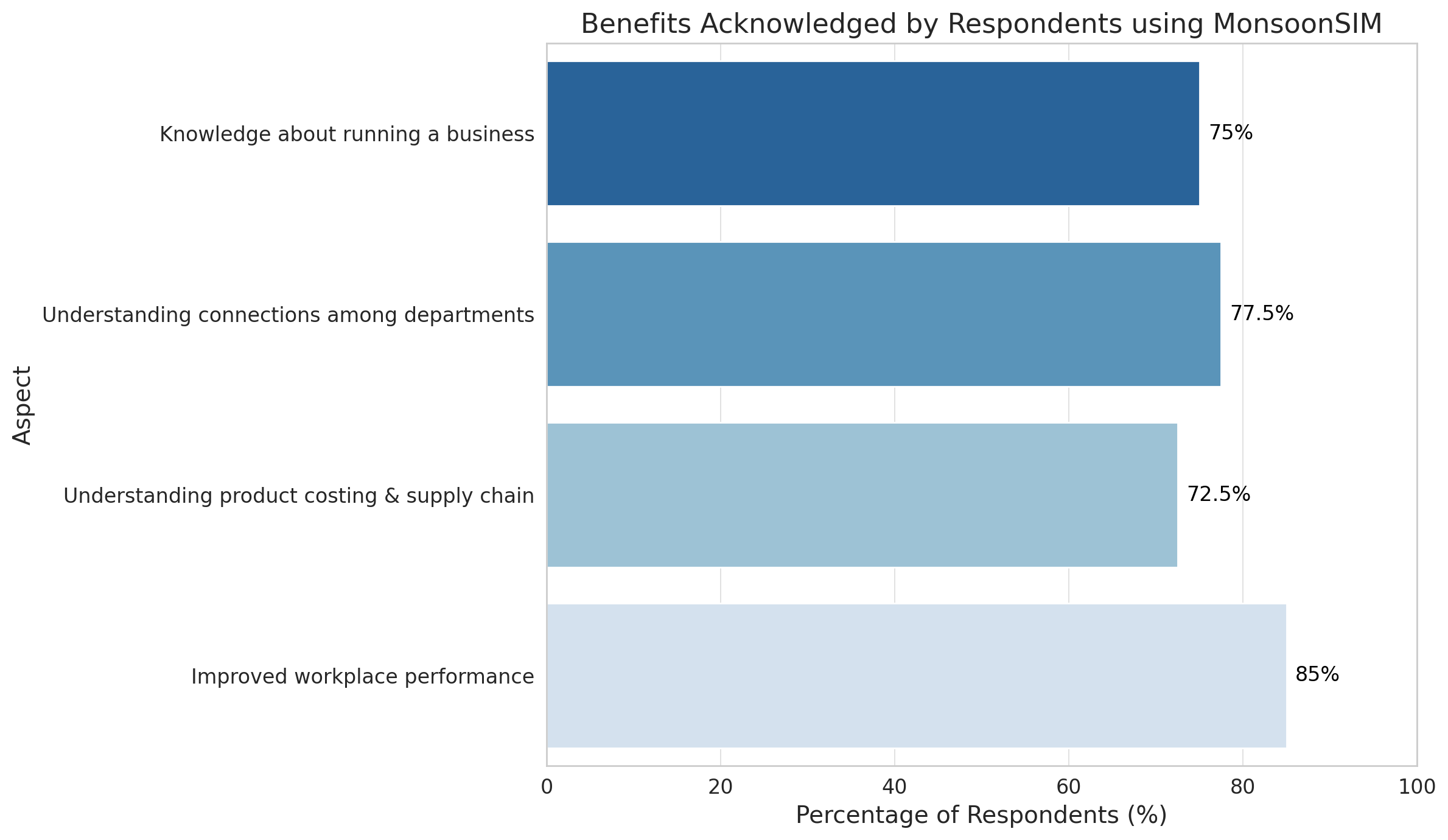
Qualitative Benefits:
- Increased Student Satisfaction: Feedback from students typically highlights a higher level of satisfaction due to the hands-on, interactive nature of the learning experience. Students appreciate the ability to apply theoretical knowledge in a practical setting, which helps them retain information more effectively.
- Enhanced Motivation: The gamified elements of MonsoonSIM, combined with the real-time adaptive challenges provided by AI, result in higher levels of motivation among students. They are more engaged in their learning and more driven to excel in the simulation.
Example of Success:
At Deakin University, the use of MonsoonSIM in capstone units has been particularly successful. Students have reported that the simulation not only made the learning process more enjoyable but also provided them with a deeper understanding of how theoretical concepts apply in real-world business situations. This has been reflected in both their academic performance and their preparedness for the job market.
Leveraging Learning Analytics for Personalized Education
MonsoonSIM's integration of AI-powered tools and learning analytics provides a robust framework for personalized education. By leveraging real-time data, educators can track student progress and adapt the curriculum to meet individual learning needs. This adaptive learning environment not only improves student engagement but also enhances knowledge retention. For example, MonsoonSIM’s Boz AI assistant offers real-time feedback, ensuring that learners receive immediate guidance on their decisions, thus fostering a more interactive and supportive learning experience. By utilizing these AI-powered tools, educational institutions can implement scalable learning solutions that cater to diverse learning styles and skill levels, making MonsoonSIM an invaluable asset in modern education.
Key Benefits of Learning Analytics in MonsoonSIM
| Real-Time Data | Immediate insights into student performance |
| Adaptive Learning | Curriculum adjustments based on individual progress |
| Enhanced Engagement | Personalized feedback to keep learners motivated |
| Improved Retention | Tailored content that aligns with student learning styles |
Enhancing Interdisciplinary Teaching and Learning
MonsoonSIM excels in promoting interdisciplinary teaching and learning by integrating business, technology, and management education into its platform. This approach not only broadens the educational scope but also prepares students for the multifaceted challenges of the modern business environment. For instance, MonsoonSIM's business simulation allows learners to experience real-world business scenarios, enabling them to apply theoretical knowledge in practical settings. This hands-on approach is particularly beneficial in fostering critical thinking and problem-solving skills. Additionally, MonsoonSIM’s use of gamification elements such as leaderboards and badges keeps students engaged and motivated, further enhancing the learning experience.
Examples of Interdisciplinary Learning in MonsoonSIM
Discipline
| Business Management | Simulation of real-world business operations |
| Financial Analysis | Practical exercises in financial planning and strategy |
| Teamwork and Collaboration | Group tasks that enhance teamwork and communication skills |

